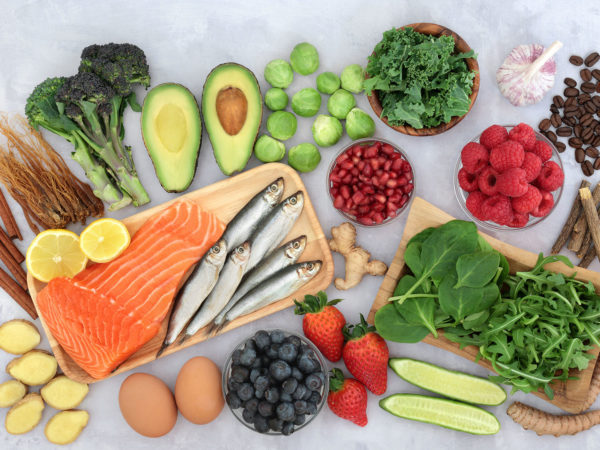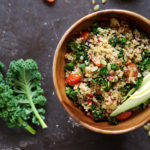Dr. Weil's Anti-Inflammatory Diet

It is becoming increasingly clear that chronic inflammation is the root cause of many serious illnesses – including heart disease, many cancers, and Alzheimer’s disease. We all know and have experienced inflammation on the surface of the body as local redness, heat, swelling and pain. It is the cornerstone of the body’s healing response, bringing more nourishment and more immune activity to a site of injury or infection. But when inflammation persists or serves no purpose, it damages the body and causes illness. Stress, lack of exercise, genetic predisposition, and exposure to toxins (like secondhand tobacco smoke) can all contribute to such chronic inflammation, and dietary choices play a significant role as well. Learning how specific foods influence the inflammatory process is the best strategy for containing it and reducing long-term disease risks. (Find more details on the mechanics of the inflammation process and the Anti-Inflammatory Food Pyramid.)
The Anti-Inflammatory Diet is not a diet in the popular sense – it is not intended as a weight-loss program (although people can and do lose weight on it), nor is the Anti-Inflammatory Diet an eating plan to stay on for a limited period of time. Rather, it is a way of selecting and preparing anti-inflammatory foods based on the scientific evidence of how they can help your body maintain optimum health. Along with influencing inflammation, this dietary strategy will provide steady energy and ample vitamins, minerals, essential fatty acids, dietary fiber, and protective phytonutrients.
You can also adapt your existing recipes according to these anti-inflammatory diet tips:
General Anti-Inflammatory Diet Tips:
- Aim for variety.
- Include as much fresh food as possible.
- Minimize your consumption of processed foods and fast food.
- Eat an abundance of fruits and vegetables.
Caloric Intake
- Most adults need to consume between 2,000 and 3,000 calories a day.
- Women and smaller and less active people need fewer calories.
- Men and larger and more active people need more calories.
- If you are eating the appropriate number of calories for your level of activity, your weight should not fluctuate greatly.
- The distribution of calories you take in should be as follows: 40 to 50 percent from carbohydrates, 30 percent from fat, and 20 to 30 percent from protein.
- Try to include carbohydrates, fat, and protein at each meal.
Carbohydrates
- On a 2,000-calorie-a-day diet, adult women should consume between 160 to 200 grams of carbohydrates a day.
- Adult men should consume between 240 to 300 grams of carbohydrates a day.
- The majority of this should be in the form of less-refined, less-processed foods with a low glycemic load.
- Reduce your consumption of foods made with flour and sugar, especially bread and most packaged snack foods (including chips and pretzels).
- Eat more whole grainssuch as brown rice, cracked wheat, and barley, in which the grain is intact or in a few large pieces. These are preferable to whole wheat flour products, which have roughly the same glycemic index as white flour products.
- Eat more beans, winter squashes, and sweet potatoes.
- Cook pasta al dente and eat it in moderation.
- Avoid products made with high-fructose corn syrup.
Fat
- On a 2,000-calorie-a-day diet, 600 calories can come from fat – that is, about 67 grams. This should be in a ratio of 1:2:1 of saturated to monounsaturated to polyunsaturated fat.
- Reduce your intake of saturated fat by eating less butter, cream, high-fat cheese, unskinned chicken and fatty meats, and products made with palm kernel oil.
- Use extra-virgin olive oil as a main cooking oil. If you want a neutral tasting oil, avocado oil is a good choice.
- Avoid regular safflower and sunflower oils, corn oil, cottonseed oil, and other seed oils.
- Strictly avoid margarine, vegetable shortening, and all products listing them as ingredients. Strictly avoid all products made with partially hydrogenated oils of any kind. Include in your diet avocados and nuts, especially walnuts, cashews, almonds, and nut butters made from them.
- For omega-3 fatty acids, eat salmon (preferably fresh or frozen wild or canned sockeye), sardines packed in water or olive oil, herring, and black cod (sablefish, butterfish); omega-3 fortified eggs; hemp seeds and flaxseeds (preferably freshly ground); or take a fish oil supplement (look for products that provide both EPA and DHA, in a convenient daily dosage of two to three grams). Vegetarians can take omega-3 supplements made from algae.
Protein
- On a 2,000-calorie-a-day diet, your daily intake of protein should be between 80 and 120 grams. Eat less protein if you have liver or kidney problems, allergies, or autoimmune disease.
- Decrease your consumption of animal protein except for fish and high quality natural cheese and yogurt.
- Eat more vegetable protein, especially from beans in general and soybeans in particular. Become familiar with the range of whole-soy foods available and find ones you like.
Fiber
- Try to eat 40 grams of fiber a day. You can achieve this by increasing your consumption of fruit, especially berries, vegetables (especially beans and avocados), and whole grains.
- Ready-made cereals can be good fiber sources, but read labels to make sure they give you at least 4 and preferably 5 grams of bran fiber per one-ounce serving.
Phytonutrients
- To get maximum nutritional protection against age-related diseases (including cardiovascular disease, cancer, and neurodegenerative disease) as well as against environmental toxicity, eat a variety of fruits, vegetables and mushrooms.
- Choose fruits and vegetables from all parts of the color spectrum, especially berries, tomatoes, orange and yellow fruits, and dark leafy greens.
- Choose organic produce whenever possible. Learn which conventionally grown crops are most likely to carry pesticide residues and avoid them.
- Eat cruciferous (cabbage-family) vegetables regularly.
- Include whole soy-based foods in your diet.
- Drink tea instead of coffee, especially good quality white, green or oolong tea.
- If you drink alcohol, use red wine preferentially.
- Enjoy plain dark chocolate in moderation (with a minimum cocoa content of 70 percent).
Vitamins and Minerals
The best way to obtain all of your daily vitamins, minerals, and micronutrients is by eating a diet high in fresh foods with an abundance of fruits and vegetables. In addition, supplement your diet with the following antioxidant cocktail to help address any dietary gaps:
- Vitamin C, 200 milligrams a day.
- Vitamin D, 2000iu a day, preferably as D3(cholecalciferol)
- Vitamin E. Most adults should limit their daily supplement intake of vitamin E to 100-200 IU (in the form of mixed tocopherols and tocotrienols).
- Selenium, 100-200 micrograms per day.
- Mixed carotenoids, 10,000-15,000 IU daily.
- The antioxidants can be most conveniently taken as part of a daily multivitamin/multimineral supplement. It should contain no iron (unless you are a female and having regular menstrual periods) and no preformed vitamin A (retinol). Take these supplements with your largest meal.
- Women should take supplemental calcium, preferably as calcium citrate, 500-700 milligrams a day, depending on their dietary intake of this mineral. Men should avoid supplemental calcium.
Other Measures To Consider
- If you are not eating oily fish at least twice a week, take supplemental fish oil, in capsule or liquid form (two to three grams a day of a product containing both EPA and DHA). Look for molecularly distilled products certified to be free of heavy metals and other contaminants.
- Talk to your doctor about going on low-dose aspirin therapy, one or two baby aspirins a day (81 or 162 milligrams).
- If you are not regularly eating ginger and turmeric, consider taking these in supplemental form.
- Add coenzyme Q10 (CoQ10) to your daily regimen: 60-100 milligrams of a softgel form taken with your largest meal.
- If you are prone to metabolic syndrome, take alpha-lipoic acid, 100 to 400 milligrams a day.
Water
- Drink pure water, or drinks that are mostly water (tea, very diluted fruit juice, sparkling water with lemon) throughout the day.
- Use bottled water or get a home water purifier if your tap water tastes of chlorine or other contaminants, or if you live in an area where the water is known or suspected to be contaminated.
Also, read the 16 Top Sources for the Anti-Inflammatory Diet
Watch Dr. Weil discuss How to Eat: The Anti-Inflammatory Diet
Originally Posted August 2006. Updated May 2024















